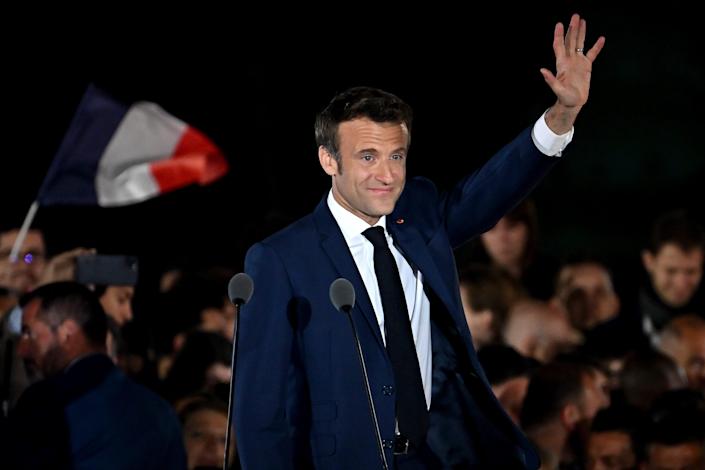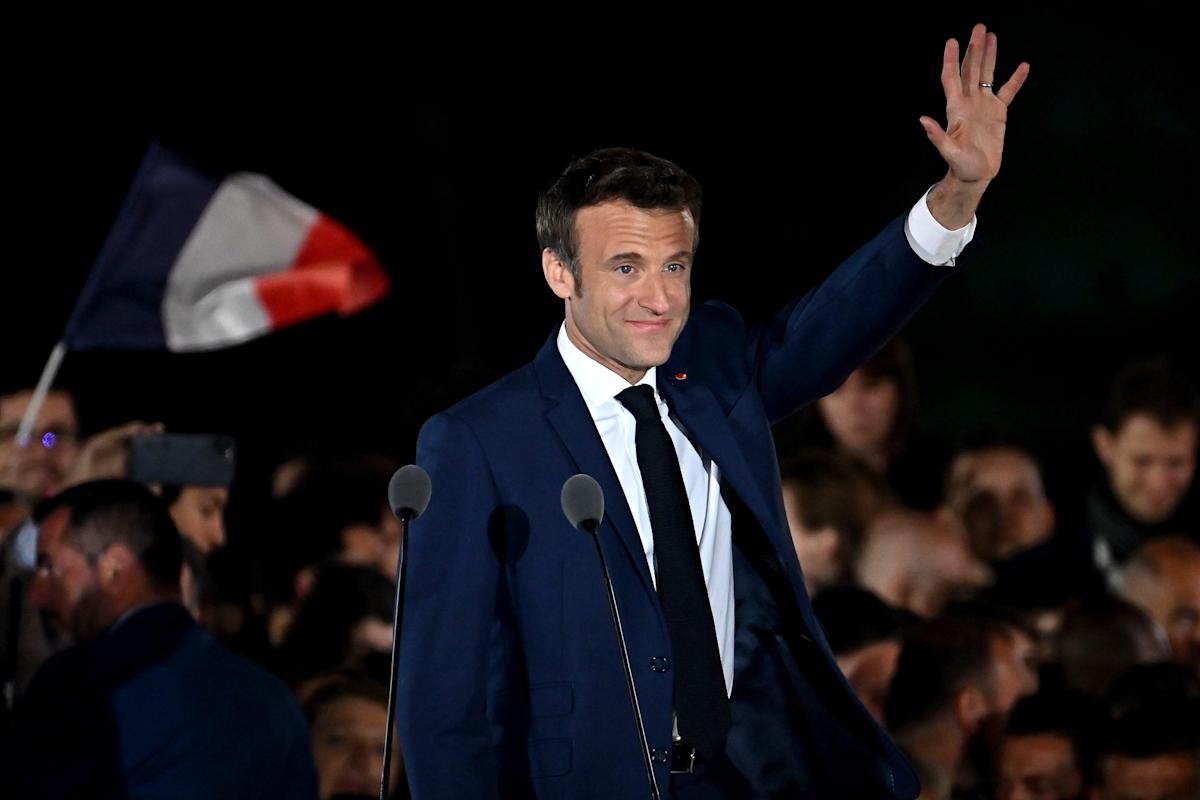WASHINGTON — French President Emmanuel Macron went to a second term on Sunday, defeating a stronger-than-expected challenge from a far-right populist who has attacked the European Union and NATO and expressed support for Russia.
“I am no longer the candidate of one side, but the president for all,” Macron told cheering supporters who gathered at the Eiffel Tower to celebrate his re-election and the defeat of challenger Marine Le Pen.
In a rematch of the 2017 presidential election, Macron Le Pen led with more than 58% of the vote, according to the expected results of the French news media, in collaboration with national pollsters.
Le Pen admitted shortly after the announced projection. She noted that she improved her performance from five years ago and will now focus on the parliamentary elections for her party.
“The game isn’t quite over yet,” she told supporters.
Five years ago, Macron defeated Le Pen with more than 66% of the vote.
Macron, 44, who built his own political party to run for president in 2017, won again despite a first term that was ravaged by protests against his economic policies, the COVID-19 pandemic and, most recently, Russia’s invasion of Ukraine. diplomatic relations deteriorated around the world.

In his victory speech, Macron acknowledged that French voters had expressed “anger” and that he must now “respond effectively”.
Macron’s re-election was also a setback for the populist movements that have rocked politics in the Western world, from Brexit to the successes of Viktor Orban in Hungary and Donald Trump in the United States.
“If you put your project back together brick by brick, it’s a project about leaving the EU, even if it’s not explicitly stated,” Macron told Le Pen in their latest debate.
US and EU officials relieved
US and European government officials greeted the news of Macron’s re-election with relief. Some analysts in the United States pointed out that Macron won despite approval ratings of less than 40% — about the same as President Joe Biden, who is considering running for reelection himself in 2024.
“An interesting observation, for your information,” tweeted White House Chief of Staff Ron Klain† “President Macron appears to have secured a double-digit victory over LePen, at a time when his approval rating is 36%. Hmmm…”
Michael McFaul, former US ambassador to Russia, pointed out that another prominent European populist – Slovenian Prime Minister Janez Jansa – was defeated on Sunday, according to vote forecasts.
Those losses could be “a huge victory for the renewal of democratic values in Europe and a huge setback for populist nationalism,” McFaul said. “Maybe the global tide is turning?”
Others pointed out that Le Pen fared better in this French election than it did five years ago, and the conservative populist movement still needs to be taken seriously in the United States, Europe and elsewhere. Le Pen himself told supporters that “more than ever I will continue my work for the French.”
CONDITION OF BREED: Emmanuel Macron vs Marine Le Pen: France votes in tense presidential second round
FIRST ROUND:Emmanuel Macron and Marine Le Pen compete for French presidency
Far right Le Pen came out strong in the first round
Le Pen had fallen less than 5 percentage points from Macron in the first ballot two weeks ago, fueling fears of an ultra-nationalist turn in French politics. Le Pen has long embraced an anti-immigrant agenda and in this campaign called for banning Muslim women from wearing headscarves in public.
In a Friday interview on BFM television in France, Macron called the election a choice “between whether or not to leave Europe” and “to leave or not to leave the secular republic”.
Le Pen, echoing the arguments of anti-globalists across the continent, said France had surrendered its sovereignty to multilateral organizations such as the EU and NATO.
Ahead of Sunday’s election, French voters expressed concern over issues that have also shaped politics in the United States and elsewhere: inflation, a sluggish economy, the fallout from the COVID-19 pandemic, immigration and the Russian invasion of Ukraine.
Macron and La Pen finished as the top two candidates from a crowded field after the first round of voting two weeks ago. By a narrower-than-expected margin, Macron finished with 27.85% of the vote and Le Pen with 23.15%.
The tight margin led to more political activity from Macron, who had concentrated on his government job and campaigned very little before that first round.
Polls in recent days have shown Macron extending his lead, but the French president warned supporters not to take anything for granted.
Macron and the Russian war in Ukraine
Macron has played a key role in organizing the Western response to Russia’s invasion of Ukraine, promoting military aid to the Ukrainians and economic sanctions against President Vladimir Putin’s government.
Le Pen is sympathetic to Putin and Russia, and a victory for her would have been a major propaganda victory for Putin’s government.
Macron played on Le Pen’s ties to Russia during the campaign, telling her in a debate: “When you talk to Russia, you talk to your banker.” He also said her anti-Muslim policies would spark a “civil war” in France.
After her loss in the 2017 presidential election, Le Pen tried to soften her image. She reversed her longstanding opposition to the euro, the EU’s currency, and changed the national party from the “National Front” to “National Rally”.
LE PEN’S AGENDA:Marine Le Pen’s far-right vision: Rearranging France at home and abroad
ATTACKS ON MACRON:French President Emmanuel Macron punched in the face while touring a small village
This time, Le Pen focused more on the economic fears of many French voters. One of her goals: Macron’s plan to raise the retirement age from 62 to 65.
The challenger said she wanted to “give the French their money back”.
A Le Pen victory would have meant profound changes for the French and their relationship with the EU and NATO, organizations with close ties to the United States. France is the second largest economy in the EU and has nuclear weapons.
Now Macron is getting a second term for his more global agenda.
Historian Simon Schama tweeted that it “looks like those endlessly repeating self-feeding newspaper predictions that this would be a nail biter because France hated Macron so much and Le Pen is now so reassuringly all hugely mistaken.”
The results of the French election are a victory for the EU, NATO and their US allies, but also a warning that the populism of people like Le Pen is not dead.
Le Pen received more votes overall than five years ago, noted Benjamin Haddad, the senior director of the Atlantic Council’s Europe Center. The estimated turnout on Sunday was less than 75%, low by French standards.
“There is discontent,” Haddad said. “There is anger. There is anger at the cost of living.”
Macron gathered his candidacy with strong debate last week, he said, and appears poised to continue pursuing a “reformist liberal agenda.
“There are things he has to deal with,” Haddad said. “He is aware of that.”
This article originally appeared on USA TODAY: Emmanuel Macron wins re-election as French president over Marine Le Pen

